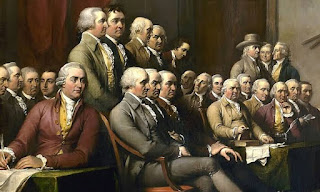Why You Should Study the U.S. Constitution
Hello,
readers! At this time in November, we have just elected what I believe will
have been the most problematic administrations of our nation’s history.
Of
course, I’m not particularly happy with the outcome of the elections. I did a
little bit of campaigning for Kamala Harris and some of the Democratic
candidates in a few of the “blue wall” states. While I was doing this I spoke
with a number of people about the issues of the day. I found to my horror that many
of the people in this nation held a lot of strange beliefs that could only be
attributed to a lack of good information as to how things work in this country.
To
address this, I have decided to change the tone and content of my output,
starting here, I will begin concentrating my efforts on reviewing basic
constitutional principles.
The
U.S. Constitution is more than an old document tucked away in the National
Archives. It is the bedrock of our democracy, shaping the government’s
structure and guaranteeing the rights of its citizens. For young people,
especially in a world grappling with political unrest and misinformation,
studying the Constitution offers more than just historical insights—it provides
tools to safeguard democracy, advance careers, and combat bad actors who seek
to exploit systems for personal gain.
Here
is the Preamble:
We the people of the United States, in Order to form a
more perfect Union, establish Justice, insure domestic Tranquility, provide for
the common defence, promote the general Welfare, and secure the Blessings of
Liberty to ourselves and our Posterity, do ordain and establish this
Constitution for the United States of America.
Understanding
Power to Prevent Abuse
In
case you’re wondering, the kind people at Project Gutenberg (https://www.gutenberg.org/cache/epub/5/pg5-images.html).opted
not to modernize the original language that the country’s framers wrote it in. The
country had only been free of English rule for a very short period of time
before the founders of the newly minted nation met to iron out the particulars
of the new Republic they were forming. The “King’s English” was the order of
the day.
That
notwithstanding the intent of the writers is very clear.
Article 1
Section 1. All
legislative Powers herein granted shall be vested in a Congress of the United
States, which shall consist of a Senate and House of Representatives.
Section 2. The
House of Representatives shall be composed of Members chosen every second Year
by the People of the several States, and the electors in each State shall have
the qualifications requisite for electors of the most numerous branch of the
State legislature.
No Person shall be a Representative who shall not have
attained to the Age of twenty five Years, and been seven Years a citizen of the
United States, and who shall not, when elected, be an Inhabitant of that State
in which he shall be chosen.
The
Constitution outlines checks and balances designed to prevent any one branch of
government from becoming too powerful. However, these safeguards only work when
citizens understand and defend them. Unscrupulous individuals and organizations
often rely on public ignorance to push agendas that erode rights and undermine
democracy.
The
first order of business listed by the Constitutional Congress was to define who
would hold the reins of power in the country. Article I defines the Congress
first. The vote of the people would elect each Senator and member of the House
of Representatives.
By
studying the Constitution, you can identify attempts to circumvent its
principles and hold those in power accountable. Knowledge empowers individuals
to challenge unethical actions without fear of reprisal from those who assume
their manipulations will go unnoticed. A well-informed citizenry is a shield
against corruption and an essential element of a thriving democracy.
That’s
about it for now. This article is only an introduction to the material. Trust
me, the Constitution is a large, imposing document, even without the Bill of
Rights, only a portion of the amendments the document contains.
A
couple of things I want to clear up first. First of all, I am not what you call
an expert on the law, so don’t come running after me looking for legal advice!
There
are, however, a few good Constitutional scholars. Representative Jamie Raskin,
for instance, heads up an event called Democracy Summer that educates ordinary
people – like you, I’m sure - about basic civics and Constitutional Democracy. Get
the details about it on his page: https://jamieraskin.com/democracy-summer/
If you like what I have been posting here, and want to lend a hand you can send a small donation to one of these cryptocurrency addresses:
In the next segment, we’ll discuss the structure of our governance.






Comments
Post a Comment